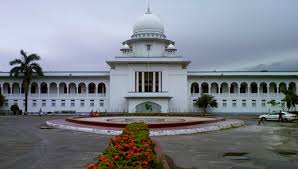The judgment
In its landmark ‘Masdar Hossain judgment’, the Appellate Division addressed head on certain concerns regarding executive control over the judiciary. It reaffirmed the principle of independence of the judiciary, and elaborated on the constitutional position and practice regarding separation of the judiciary from the executive. Most importantly, it laid down twelve declarations and directions (‘the twelve commandments’) for implementation by the Government in this regard.
This decision originated in a constitutional challenge brought before the High Court by 218 persons in judicial service, including Masdar Hossain. They argued that subordinate courts were part of the judiciary and therefore persons in judicial service could not be included within the Bangladesh Civil Service (Reorganization) Order 1980, nor could they be controlled as though they were a part of the Bangladesh Civil Service, as defined by the Bangladesh Civil Service Rules 1981. The High Court Division held in favor of Masdar Hossain and the other judges, and after the Government appealed this decision and lost, the Appellate Division affirmed the High Court’s judgment.
In this judgment, the Appellate Division affirmed that a separate Judicial Service should be established, distinct from the Executive and Administrative Cadres of the Bangladesh Civil Service. It also noted that this separate Judicial Service should include both persons in judicial service and magistrates exercising judicial functions. It stated that these two categories formed a class distinct from other services of the Republic, and that they could not be ‘treated alike or merged or amalgamated with any other service, except a service of an allied nature’. In consequence, the Court held that the Government’s inclusion of judicial officers within the Bangladesh Civil Service (Reorganization) Order 1980 as the Bangladesh Civil Service (Judicial) was beyond the terms of the Constitution.
The judgment identifies five key characteristics of independence of the judiciary, namely: security of tenure; recruitment to the Judicial Service as permanent and through a transparent Judicial Service Commission; security of emoluments including pension etc.; institutional functional independence of subordinate judiciary from the Parliament and the Executive; and financial autonomy within the sphere funds allocated.
The judgment contains twelve specific directions on the Government for measures to ensure separation of the judiciary, by creating a new Judicial Service to include the magistracy. These directions, among others, required the Government:
- to set up two separate bodies, the Judicial Service Commission (JSC) (to recruit persons in judicial service, including judicial magistrates), and the Judicial Pay Commission (JPC) (to fix pay scales for members of the judicial service), specifying the nature of their composition, powers and functions.
- to frame and bring into force four sets of rules relating to the establishment of the JSC (for recruitment of members of the Judicial Service), establishment of the JPC (for fixation of their pay and benefits), for ensuring the manner of the Constitution, composition, recruitment and suspension of members of the service, and for ensuring matters relating to posting, promotion, and other service conditions.
- for the purpose of incorporating magistrates within the judicial service, to frame amendments to the Code of Criminal Procedure and other laws that empower Magistrates to try criminal cases, so that all references to ‘Magistrate’ in existing laws would be replaced by the term ‘Judicial Magistrate’.
The twelve Masdar Hossain directions
- It is declared that the judicial service is a ‘service of the Republic’ within the meaning of Art. 152(1) of the Constitution, but is a functionally and structurally distinct and separate service from civil executive and administrative services of the Republic with which the judicial service cannot be placed on par on any account and that it cannot be amalgamated, abolished, replaced, mixed up and tied together with civil executive and administrative services.
- It is declared that the word ‘appointments’ in Art. 115 means that it is the President can create and establish a judicial service and also a magistracy exercising judicial functions, make recruitment rules and all pre-appointment rules in that behalf, make rules regulating their suspension and dismissal under Art. 115 but Art. 115 does not contain any rule-making authority with regard to other terms and conditions of service and that Art. 133 of the Constitution and the Services (Reorganizations and Conditions) Act, 1975 have no application on the above matters in respect of judicial functions.
- It is declared that the creation of BCS (Judicial) cadre along with the other BCS executive and administrative cadres by the Bangladesh Civil Service (Reorganization) Order, 1980 with amendment of 1981 is ultra vires the Constitution. It is also declared that Bangladesh Civil Service Recruitment Rules, 1981 are inapplicable to the judicial service.
- The appellant and other respondents to writ petition are directed that necessary steps should be taken forthwith for the President to make Rules under Art. 115 to implement its provisions which are a constitutional mandate and not a mere enabling power. It is directed that the nomenclature of the judicial service shall follow the language of the Constitution and shall be designated as the Judicial Service of Bangladesh or Bangladesh Judicial Service. They are further directed that either by legislation or by framing Rules under Art. 115 or by executive order having the force of Rules, a Judicial Services Commission should be established forthwith with majority of members from higher judiciary of the Supreme Court and subordinate courts for recruitment to the Judicial Service on merit with the objective of achieving equality between men and women in the recruitment.
- It is directed that under Art. 133 law or rules or executive orders having the force of Rules relating to posting, promotion, grant of leave, discipline (except suspension and removal), allowances, pension (as a matter of right, not favor) and other terms and conditions of service, consistent with Arts. 116 and 116A, as interpreted by us, be enacted or framed or made separately for the judicial service and magistrates exercising judicial functions keeping in view of the constitutional status of the said service.
- The impugned orders in the writ petition dated 28 Februay 1994 and 2 November 1995 are declared to be ultra vires the Constitution for the reasons stated in the judgment. The appellant and the other respondents to the writ petition are directed to establish a separate Judicial Pay Commission forthwith as a part of the Rules to be framed under Art. 115 to review the pay, allowances and other privileges of the judicial service which shall convene at stated intervals to keep the process of review a continued one. The judicial service shall follow the recommendations of the Commission.
- It is declared that in exercising control and discipline of persons employed in judicial services and magistrates exercising judicial functions under Art. 116, views and opinion of the Supreme Court shall have primacy over those of executives.
- The essential conditions of judicial independence in Art. 116A, elaborated in the judgment, namely, (1) security of tenure, (2) security of salary and other benefits and pension and (3) institutional independence from the Parliament and the Executive shall be secured in the law or rules made under Art. 133 or in executive orders having the force of Rules.
- It is declared that the executive Government shall not require the Supreme Court of Bangladesh to seek their approval to incur any expenditure on any item from the funds allocated to the Supreme Court in annual budgets, provided the expenditure incurred falls within the limit of sanctioned budgets, as more fully explained in the body of the judgment. Necessary administrative instructions and financial delegations to ensure compliance with this direction shall be issued by the Government to all concerned including the appellant and other respondents to the writ petition by 31 May 2000.
- It is declared that the members of the judicial service are within the jurisdiction of the administrative tribunal. The declaration of the High Court Division to the opposite effect is set aside.
- The declaration by the High Court Division that for separation of the subordinate judiciary from the executive no further constitutional amendment is necessary is set aside. If the Parliament wishes so, it can amend the Constitution to make the separation more meaningful, pronounced and effective.
- It is declared that until the Judicial Pay Commission gives its first recommendation, the salary of Judges in the judicial service will continue to be governed by status quo [ante] as on 8 January 1994 vide paragraph 3 of the order of the same date and also by the further directions of the High Court Division in respect of Assistant Judges and Senior Assistant Judges. If pay increases are affected in respect of other services of the Republic before the Judicial Pay Commission gives its first recommendation, the members of judicial services will get increases in pay etc. commensurate with their special status in the Constitution and in conformity with the pay etc. that they are presently receiving.
Now every institution, authority and individual associated with the judicial administration is required to advance, strengthen and achieve these measures.
Post-Masdar developments
Despite the passage of almost six years, the Government has yet to fully comply with the ‘Masdar Hossain directions’. The earliest measure taken to comply with the judgment concerned the financial autonomy of the Supreme Court.
Subsequently, the Government promulgated the JSC Rules and published them in the Bangladesh Gazette. Thus a new and separate ‘Bangladesh Judicial Service’ was created, and a seven member Judicial Service Commission was established. Since then, some 230 persons have been appointed to judicial services by the JSC, and are now posted at various courts across Bangladesh.
Following protracted hearings before the Appellate Division regarding the proposed legislation required to secure the other key aspects of independence of the lower judiciary regarding security of tenure, superintendence and control etc, the Government in 2006 framed further legislation. This included the promulgation of three sets of Rules regarding the terms and conditions applicable to the Judicial Service, as follows:
- The Bangladesh Judicial Service (Pay Commission) Rules (‘the JPC Rules’)
- The Bangladesh Judicial Service (Service Constitution, Composition, Recruitment and Suspension, Dismissal & Removal) Rules (‘the Composition Rules’)
- The Bangladesh Judicial Service (Posting, Promotion, Leave, Control, Discipline and other Service Conditions) Rules (‘the Posting Rules’)
The JPC Rules provide for establishing a JPC comprising of the Auditor General Secretary, Finance Division, Secretary, Ministry of Establishment, Secretary, Ministry of Law and the Registrar, Bangladesh Supreme Court. The JPC’s functions include review and recommendation of the salary structure of judicial officers, on consideration of the salary or remuneration structure pertaining to the Judiciary.
The Composition Rules provide for the controlling authority for the Judicial Service, and for matters of recruitment, suspension dismissal and removal. They provide that the controlling authority for the Judicial Service would be the ‘Appropriate Authority’ and define the Authority as ‘the President or a Ministry or Division which is entrusted with the administration of the Service under the Rules of Business as framed by the President under Art. 55(6) of the Constitution.’ With regard to increase and decrease of number of posts and re-composition of the Service, these Rules provide that the ‘Appropriate Authority’ is required to obtain consent from the Ministry of Establishment and the Ministry of Finance. They further provide that the Judicial Service shall comprise of such posts as are set out in the Schedule, but the Schedule does not contain any reference to Magistrates and the definition of ‘Judicial Service’ also does not include Magistrates.
The Posting Rules provide that the ‘Appropriate Authority’ shall determine posting of members of the Service in consultation with the Supreme Court, but do not specify that the Supreme Court’s opinion would have primacy. They also do not specify the consequences of non-compliance with the Rules. Further they explicitly sanction continuation of the practice of deputation and appear to widen its scope by providing that in addition to posts which have been reserved under a gazette notification (being SRO dated 22 February 2001) Judicial Officers may also be posted on deputation to ‘any other government office or any other authority’.
In addition to the above four sets of rules, and in order to ensure the incorporation of judicial magistrates into the Judicial Service, the Government has framed (but not yet notified) the Draft Code of Criminal Procedure (Amendment) Bill (the CrPC Bill).
This has been pending scrutiny by the Parliamentary Standing Committee on Law and Justice since February 2006. The Draft Bill provides for creating two classes of magistrates, namely Executive Magistrates, who would be recruited from amongst persons employed in the Bangladesh Civil Service (Administration) and Judicial Magistrates from amongst persons employed in the (newly created) Bangladesh Judicial Service. It also replaces all existing references in the CrPC to ‘Magistrate’ without any qualifying word by the term ‘Judicial Magistrate’.
Finally, it clearly differentiates the powers and functions of Executive and Judicial Magistrates respectively, both under the Code and other laws. So the powers and functions of Judicial Magistrates under a law other than the Code would include the appreciation or shifting of evidence or the formulation of any decision which exposes any person to any punishment or penalty or detention in custody pending investigation, inquiry or trial or other proceeding or would have the effect of sending him for trial before any Court. In contrast the powers of Executive Magistrates would be limited to functions which are administrative or executive in nature, such as granting of a license, suspension or cancellation of a license, sanctioning a prosecution or withdrawing from a prosecution.
In the meantime, a number of actions have been taken by the Government which detract from the letter and spirit of the ‘Masdar Hossain judgment’, and have themselves been the subject of questioning and further constitutional challenge by lawyers focused on ensuring compliance with the judgment. One such case concerns the transfer of judicial officers without the consent of the Chief Justice. Another two writ petitions have been filed challenging the appointment of Additional District Magistrates and the creation of new Magistrate’s Courts without consultation with the Supreme Court. Both these writ petitions are now pending before the High Court Division for final hearing.
At the time of writing, the ‘Masdar Hossain judgment’ remains under active consideration by the Supreme Court. In July 2006, Masdar Hossain’s lawyers, intervening in the case, had placed before the AD a comparative chart depicting ‘the anomalies that the government has created’ with regard to implementation of the 12 point directives and pointing to many discrepancies between the notified rules and the judgment. In November 2006, the Appellate Division has yet to rule on these matters.
Concerns regarding post-Masdar developments
This section outlines some of the apparent discrepancies between the four sets of Rules that have been promulgated (the Notified Rules), and the earlier versions approved by the AD in May 2003 (the Modified Rules). On a reading of the texts, reinforced by the views of jurists and civil servants consulted in the course of this study, certain concerns arise regarding whether and to what extent the Notified Rules would fully achieve separation of the lower judiciary from the executive. These concerns are set out below and relate in turn to the composition of various bodies, their powers and functions, the nature of the controlling authority and the nature and composition of the judicial service, inasmuch as in each case, there remains considerable practical scope for executive interference at each level.
Composition of the JSC and JPC
The JSC as finally established has only seven as opposed to eleven members earlier proposed. Among them, arguably the majority of the Commission members are not judicial officers that are if the Secretary, Ministry of Law is considered to be an administrative officer by virtue of serving in an administrative post.
The composition of the JPC also appears to leave considerable scope for executive control of the body. The current composition, and the rule that a quorum of the commission requires only three persons, means that the JPC could if necessary take decisions without the presence or participation of any member of the judiciary.
Composition of the Judicial Service
The exclusion of any reference to Magistrates in the Schedule of the Composition Rules and in the definition of Judicial Service indicates that the Magistracy would not be included in the definition of the judicial service. This omission appears to indicate that the Magistracy is not going to be part of the Judicial Service and would continue to be controlled by the executive.
Powers and Functions
The Posting Rules provide for posting Judicial Officers on deputation to various offices, including the Ministry of Law, the Supreme Court, the Parliamentary Secretariat and the Election Commission. The Posting Rules further appear to widen the scope of deputation from that envisaged by the original Draft Rules.
Controlling authority for the Judicial Service
The provision regarding the ‘Appropriate Authority’ in the Composition Rules, together with the provision in the Rules of Business for the Ministry of Law to be responsible for administration of the Judicial Service would suggest that the Ministry will remain the controlling authority without further changes. This indicates a need for amendment of the Rules of Business to define the Appropriate Authority as an independent body, separate from any Ministry or Division.
With regard to posting, Rule 3 of the Posting Rules provides that the ‘Appropriate Authority’ shall determine posting of the members of the Service in consultation with the Supreme Court, thus omitting the requirement (included in the original draft Posting Rules) that in the event of difference of opinion, the opinion of the Supreme Court would have primacy.
The Posting Rules are silent about the consequence of non-compliance with the Rules, i.e. they do not specify whether a posting without consultation with the Supreme Court would be invalid, and it may therefore be argued that the Rules are directory not mandatory This leaves open the possibility that the opinion of the ‘Appropriate Authority’, that is the Executive, would prevail.
The ‘deputation’ of persons in judicial service to various non -judicial executive posts is a particularly controversial issue affecting the separation process. As noted above, about 15% of judicial officers are still routinely posted on ‘deputation’ to non-judicial posts in various Ministries, Departments, and Corporations. Deputation is a service condition provided in respect of services as defined by the Bangladesh Civil Service Recruitment Rules 1981 (the 1981 Rules).
In Masdar Hossain’s Case, the AD held that these Rules are unconstitutional to the extent that they relate to the judiciary, and that the Judicial Service is not a Service as understood by these Rules.
It also noted that although the judicial service is declared to be a ‘service of the republic’, the status of judicial officers is not a kin to that of ‘executive’ officers who form part of the Government administration.
It may be noted that the Constitution defines ‘Judicial Service’ as a service comprising of persons holding judicial posts, and contains no provision for appointment of members of the Judicial Service on deputation to executive posts. The absence of any such provision appears to indicate that the framers of the Constitution did not envisage that members of the judicial service would be allowed to serve as executive officers. Indeed, the entire practice of deputation appears contrary to constitutional provisions on independence of the judiciary [Arts. 22, 35(3) and 116A]. If the executive branch of the Government is vested with the authority to withdraw judges from the judicial service and post them in executive posts in executive ministries and departments, then the constitutional concept of functional independence of the judges and judicial magistrates would appear to be wholly undermined.
Thus the continuing practice of deputation – in respect of posting judicial officers to executive posts – appears contrary to the spirit of the judgment as well as the Constitution.
The question now is of how the practice of deputation would be addressed in the draft laws framed pursuant to the ‘Masdar Hossain judgment’. The initial Draft Rules submitted by the Government to the AD contained no provision for such deputation. The Modified Rules approved by the AD by its order dated 26 January 2003 first included such a provision. Rule 7 of the Modified Rules envisages a situation whereby judicial officers may be posted on deputation to (a) the Supreme Court, (b) the Ministry of Law Justice and Parliamentary Affairs against the reserved posts and (c) any other Ministry, the Parliament Secretariat or Election Commission. This provision did not seem to allow posting of judicial officers to any government department or corporation. Subsequently, given the AD’s direction allowing the President to reframe the Rules, the Government widened the scope of deputation providing for persons in judicial service to be posted to any Ministry, Department or Corporation. This remains the position in the notified Posting Rules.
















